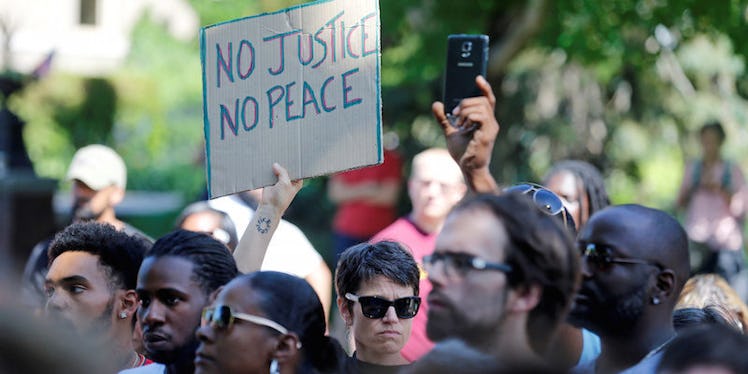
Racial Violence Is Nothing New, iPhones Are Just Finally Forcing Us To See It
After the horrifying police killings of Alton Sterling and Philando Castile, a friend texted me late on Wednesday night. Clearly referencing the recent and disturbing events, he asked me,
WTF is happening?
I responded,
Social media is exposing us [white America] to the unsettling reality that is black America... Smartphones have become weapons against injustice.
My conversation with my friend was emblematic of both white America's overwhelming unfamiliarity with the racial violence perpetrated by police and the importance of smartphones in terms of documenting that violence and exposing it to the world.
Indeed, from Eric Garner and Walter Scott to Alton Sterling and Philando Castile, smartphones and social media have revolutionized the conversation surrounding police violence in America.
There are still people who insist we live in a post-racial society, but for many, the videos, like those from the killings of Sterling and Castile, are massive wake-up calls.
The sad truth is this has been the reality in black America for decades -- from Jim Crow to the present day. The black community in the US is no stranger to police violence or injustice inflicted upon it on behalf of the criminal justice system.
But, with smartphones and social media, people who've seemingly been unaware of this trend (primarily whites who don't have to deal with it) are finally beginning to see the unsettling truth.
As comedian Larry Wilmore stated in the wake of the shootings of Sterling and Castile,
Thank god for fucking cell phones. We would never even hear about incidents like this this otherwise. In fact, part of what makes people in the black community so enraged about this is, for years, we never had evidence of these things.
In 2015, police killed 1,134 Americans, according to The Guardian's project "The Counted," which tracked police killings in the US.
The Guardian's count showed black people were killed at twice the rate of white Americans, and young, black men were nine times more likely to be killed than other Americans.
So far in 2016, of the 561 people killed by police, at least 136 were black, according to The Guardian.
These numbers should be enough to spur any of us into action, but the deaths continue.
However, smartphones, and their capacity to record video and images, can definitely be catalysts for change.
Images are exceptionally powerful. They put statistics into perspective, forcing people to see the horror behind the numbers.
With that said, smartphones are just one tool against injustice; they aren't a solution.
But we, as citizens, can clearly use them for far more than taking pictures of our food or an endless array of selfies.
We (Millennials) are a generation who never puts down our phones. Let's use them for something meaningful. Let's keep the conversation going.
Silence is the biggest impediment to change.
If we truly want to do something about police violence in America and the undeniable systemic racism that plagues this country, we have to be an active part of the conversation. This goes beyond social media -- it must also occur in our living rooms, classrooms and public spaces.
America has not escaped the legacies of slavery and Jim Crow, among other bigoted aspects of its history. It's vital we acknowledge this.
None of us can afford to stand idly by as American citizens are executed in the streets.
These people were human beings, not just statistics. They had lives and stories of their own. They were loved by people who now have to go on living in a society that didn't do enough to prevent their deaths.